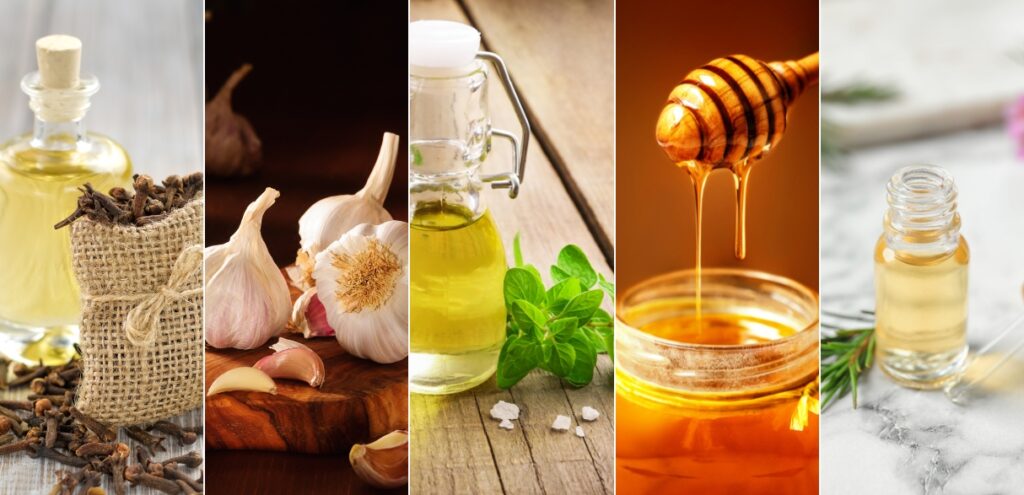Tooth infections can be painful, urgent, and worrisome. While dentists often prescribe antibiotics to control infection, many people are curious about natural alternatives. The question arises: what is the strongest natural antibiotic for tooth infection? The strongest natural antibiotic for tooth infection is garlic (allicin), widely recognized for its antibacterial, antifungal, and antiviral effects. Garlic has been shown to target oral bacteria responsible for abscesses and gum infections. Other natural antibiotics include clove oil, turmeric, honey, and oregano oil, which all carry antimicrobial power. While these remedies may ease symptoms, they should complement not replace professional dental care.
This article explores the best natural antibiotics, their effectiveness, benefits, and limitations. It also clarifies when natural approaches are helpful and when urgent medical care is essential.
Understanding Tooth Infections
A tooth infection, also known as a dental abscess, develops when bacteria invade the pulp of the tooth or the surrounding gum tissue. This condition often results from untreated cavities, gum disease, or trauma. The infection produces pus, swelling, and significant pain. If left untreated, bacteria can spread to the jaw, sinuses, or bloodstream, becoming life-threatening. Therefore, while natural antibiotics can provide relief, they must not be seen as permanent solutions.
Why Natural Antibiotics Matter
Conventional antibiotics such as amoxicillin or clindamycin are effective, but overuse has led to antibiotic resistance worldwide. Natural antibiotics offer additional support by:
- Reducing bacterial load in the mouth
- Alleviating swelling and discomfort
- Supporting the body’s healing process
- Offering antimicrobial effects without contributing to resistance
These remedies are easily accessible and can be used alongside dental treatment for better outcomes.
Natural Antibiotics for Tooth Infection
Comparison of popular natural antibiotics, their active compounds, and effectiveness in dental health:
| Natural Antibiotic | Active Compound | Primary Benefit for Tooth Infection | Strength of Evidence | Usage Method |
|---|---|---|---|---|
| Garlic | Allicin | Kills oral pathogens, reduces swelling | Strong (traditional + scientific studies) | Chew raw garlic, garlic oil on affected area |
| Clove Oil | Eugenol | Pain relief, antiseptic effect | Strong (used in dentistry) | Apply diluted oil directly on gum/tooth |
| Turmeric | Curcumin | Anti-inflammatory, antibacterial | Moderate | Turmeric paste or turmeric tea |
| Manuka Honey | Methylglyoxal | Reduces bacterial growth, soothes tissue | Strong (clinical evidence) | Apply small amount directly, mix with warm water |
| Oregano Oil | Carvacrol, Thymol | Potent antibacterial, antifungal | Strong | Dilute in carrier oil, apply to gum |
| Saltwater Rinse | Sodium chloride | Cleanses, reduces inflammation | Strong traditional | Rinse with warm saltwater multiple times daily |
| Ginger | Gingerol | Anti-inflammatory, reduces swelling | Moderate | Chew raw ginger, ginger tea |
| Aloe Vera | Anthraquinones | Soothes gums, reduces bacteria | Moderate | Apply gel around affected area |

Garlic: Nature’s Strongest Antibiotic
Garlic stands out as the most powerful natural antibiotic for tooth infection. Its compound allicin is released when raw garlic is crushed or chewed. Allicin can attack a broad range of bacteria, including Streptococcus mutans and Porphyromonas gingivalis, two of the main bacteria involved in dental infections.
- How to use: Crush fresh garlic, allow it to rest for 10 minutes, then chew or place it near the infected tooth. Garlic oil mixed with a carrier oil can also be applied topically.
- Limitations: Raw garlic is strong and may cause a burning sensation or stomach upset if swallowed in large amounts.
Clove Oil: The Dentist’s Favorite Remedy
Clove oil is not just a folk remedy; it has a long-standing presence in dentistry. Its active ingredient, eugenol, provides both antimicrobial and analgesic effects. It numbs pain almost immediately and slows bacterial growth.
- How to use: Dilute clove oil with olive oil or coconut oil to avoid irritation. Apply with a cotton swab directly on the infected area.
- Limitations: Overuse of undiluted clove oil can cause burns to oral tissues.
Turmeric: The Golden Root
Turmeric’s active compound, curcumin, has anti-inflammatory and antibacterial properties. Turmeric paste can reduce gum swelling and slow bacterial growth.
- How to use: Mix turmeric powder with water or coconut oil to create a paste, then apply it to gums. Turmeric tea can also help with internal healing.
- Limitations: Turmeric stains teeth temporarily, though the stains usually fade with brushing.
Manuka Honey: Sweet but Strong
Unlike regular honey, Manuka honey has a unique compound called methylglyoxal that gives it remarkable antimicrobial power. It reduces bacterial colonies and calms swollen gum tissue.
- How to use: Apply a thin layer to the infected area or dissolve a spoonful in warm water and swish.
- Limitations: High sugar content means it should be used sparingly to avoid promoting cavities.
Oregano Oil: Potent and Effective
Oregano oil, rich in carvacrol and thymol, is one of the most concentrated natural antimicrobials. It has shown effectiveness against drug-resistant bacteria, making it a strong contender for dental infections.
- How to use: Always dilute oregano oil in a carrier oil before applying it near gums or teeth.
- Limitations: Undiluted oil is extremely harsh and may damage soft tissue.
Other Helpful Natural Approaches
- Saltwater Rinse: One of the oldest remedies, saltwater helps cleanse pus, reduce inflammation, and create a hostile environment for bacteria.
- Ginger: Mildly antibacterial and anti-inflammatory, ginger soothes gum irritation.
- Aloe Vera Gel: Provides a soothing, cooling effect while inhibiting bacterial growth.
When to Seek Professional Help
Natural antibiotics provide relief, but they are not substitutes for dental treatment. You should seek immediate dental care if you notice:
- Swelling in the face or jaw
- High fever or chills
- Difficulty breathing or swallowing
- Pain that does not subside with remedies
A dentist may need to drain the abscess, prescribe antibiotics, or perform a root canal to fully resolve the infection.
The Science Behind Natural Antibiotics
Recent research highlights the role of natural compounds in oral health. For example:
- Garlic’s allicin disrupts bacterial cell walls.
- Clove oil’s eugenol binds with pain receptors to block signals.
- Manuka honey reduces biofilm formation in the mouth.
- Oregano oil has been found to inhibit resistant strains of bacteria.
These findings show that natural antibiotics are not merely folk traditions but supported by modern science.
Limitations of Natural Remedies
While natural antibiotics are powerful, they come with caveats:
- They work best as supplements, not as replacements for medical care.
- Dosage control can be difficult.
- They may cause irritation or allergic reactions.
- Not all remedies have equal scientific backing.
Building a Holistic Dental Care Routine
Tooth infections highlight the importance of daily prevention. Combining natural remedies with good dental hygiene creates the strongest protection.
- Brush at least twice a day with fluoride toothpaste.
- Floss to remove food particles.
- Rinse with natural mouthwashes like saltwater or diluted essential oils.
- Maintain a balanced diet rich in vitamins C, D, and calcium.
Final Thoughts
So, what is the strongest natural antibiotic for tooth infection? The answer is garlic, backed by both tradition and modern science. However, other natural antibiotics like clove oil, turmeric, oregano oil, and Manuka honey also provide significant support.Natural remedies can reduce pain and control bacterial growth, but they are best seen as first-line relief until professional dental treatment is available. Tooth infections are serious, and timely dental care should never be delayed.
FAQ
1. What is the strongest natural antibiotic for a tooth infection?
Garlic, due to its compound allicin, is considered the strongest natural antibiotic for tooth infections. It actively kills oral bacteria and reduces swelling, making it highly effective compared to other natural remedies.
2. Can natural antibiotics cure a tooth infection completely?
No. Natural antibiotics may ease pain and control bacteria temporarily, but a dental infection often requires professional treatment such as drainage, root canal, or prescribed antibiotics.
3. Is clove oil safe to apply directly to the gums?
Clove oil should always be diluted with a carrier oil like coconut or olive oil. Applying it directly without dilution may cause burning or irritation of the gum tissue.
4. How long does it take for natural remedies to relieve tooth infection pain?
Relief may be felt within minutes to hours, depending on the remedy. Clove oil numbs pain almost instantly, while garlic and turmeric work gradually to reduce bacterial activity and inflammation.
5. When should I stop using natural antibiotics and see a dentist?
If you have severe swelling, fever, spreading pain, or difficulty swallowing, you should stop home remedies and seek urgent dental care. These are signs the infection is worsening.

